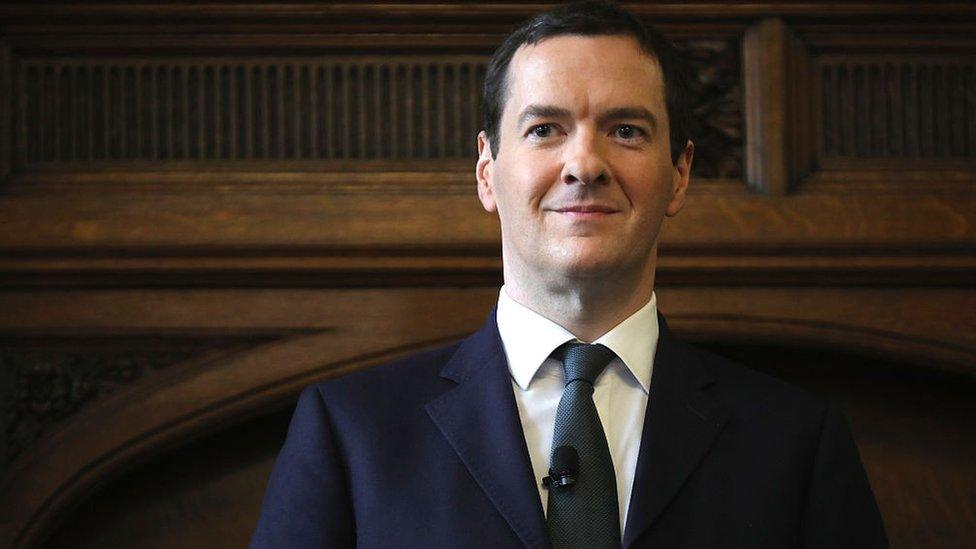The problem with corporation tax
- Published
- comments

The Labour party has said it will raise corporation tax to spend £4.8bn on improving education
It sounds like a simple equation.
Announce more money for a public policy initiative and say you will pay for it with an increase in taxes.
On Wednesday the Labour Party said that it plans to spend more than £5bn improving education in England.
To fund the initiative, the party also announced the details of its proposals to increase corporation tax from its present rate of 19% to 26% by 2020-21.
A move described by Paul Johnson of the Institute for Fiscal Studies as one of the most significant tax increases for 30 years.
Smaller firms with profits below £300,000 a year will see more modest rises - up to 21% by 2020-21.
Labour, using figures from the government's official economic watchdog, the Office for Budget Responsibility, says the increases in corporation tax will raise £20bn by 2022.
The Liberal Democrats have also pledged more money for education (£7bn) paid for by a slightly lower increase in the business tax and the scrapping of tax allowances for married couples.
As both Labour and the Liberal Democrats will know, income from corporation tax (a tax on profits made by firms), is notoriously difficult to forecast.
In 2010, corporation tax raised just over £43bn in revenue for the government.
Since then it has been cut from 28% (interestingly, above the level announced today by Labour) to 19%.
One would suppose that would reduce the tax take for the government.
Not quite.

Former chancellor George Osborne cut the headline rate of corporation tax
In 2016, corporation tax raised £49.7bn, an increase of £6.7bn.
That is due to a number of interrelated issues.
First, economic growth has returned, leading to higher profits for firms.
Higher profits mean higher levels of tax receipts.
Now, supporters of corporation tax cuts argue that the very act of reducing the rate increases firms' propensity to invest and increases confidence that Britain is a "business friendly" economy.
Reducing business taxes ultimately creates wealth, they argue.
Second, although George Osborne reduced the headline rate (some joke it is called that for a reason as cutting it produces some nice headlines), he also announced a series of other, more Delphic, measures that actually increased business taxes.
The amount of tax that can be offset against capital investment in new buildings and machinery (called capital allowances) has been reduced.
Taxes on foreign income has also been reformed and rules over the shifting of profits between different tax jurisdictions have been tightened under the "base erosion" changes agreed with the Organisation for Economic Co-operation and Development.
Alongside these changes, the government has also introduced the banking levy, an extra tax on the City which brought in £1.6bn in 2012 - a figure that rose to just under £3bn by 2016.
Relocation risk
Many businesses would argue that, yes, the corporation tax cut is welcome but business taxes are already bringing in significantly more money.
And increasing the rate to 26% will simply reduce Britain's attractiveness to business investors and lose Britain vital places in the competitiveness league tables - given that the headline rate is low by G7 standards but other business taxes are relatively high.
Further, any change would come just at the time that Brexit has left a number of firms with their fingers hovering over the "relocate" button.
The new president of France, Emmanuel Macron, says he wants to see the French corporation tax rate cut to 25% from the present 33.3%.
As Mr Johnson said on the Today programme: "The risk is, that while this [Labour plan] would raise knocking on for £20bn in the short run, it is probably going to raise rather less than that in the long run as companies invest less and take other opportunities to reduce the amount of tax that they pay.
"So, the long run behavioural result of this tax would result in revenues being less than the immediate headline increase."
Forecasts can be wrong
Corporation tax is what is known as "dynamic" - that is, changes to it result in rapid changes in behaviour as sophisticated firms manage their balance sheet in such a way as to minimise any effects and support profits and returns to shareholders (which of course, don't forget, include our pension funds).
This leads to substantial levels of forecast error.
In 2013, the OBR forecast that corporation tax receipts for 2016-17 would fall to £38.2bn.
In fact, receipts were 30% higher.
That suggests that Labour and the Liberal Democrats' plans could raise more than the forecast £20bn.
Or - given the possible economic effect on business investment - far less.
That is the problem with pledges on tax - they are predicated on a forecast about an uncertain future.
That does not mean that political parties should avoid making policy funding announcements based on best revenue estimates by official bodies.
But it does mean that voters should be aware - forecasts can be wrong.